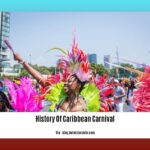The Linguistic Intricacies: Uncovering the Virgin Islands Language

Discovering the rich linguistic tapestry of the Virgin Islands unveils a captivating world of unique dialects and cultural expressions. The language spoken in this Caribbean paradise is a true testament to the beauty and diversity of human communication. With its roots deeply embedded in the history and traditions of the region, the Virgin Islands language presents a fascinating journey into the intricate web of phonetic, morphological, and syntactic features that make it distinct from other Caribbean dialects. As we delve into this linguistic exploration, a deeper appreciation for the cultural heritage and language preservation efforts of the Virgin Islands emerges. Join us on this enlightening journey as we unveil the linguistic intricacies of the Virgin Islands language and unlock a world of captivating linguistic wonders.
Key Takeaways:
- The Virgin Islands primarily speak English as their official and most widely spoken language.
- The literacy rate in the Virgin Islands is high, ranging from 90% to 95%.
- Alongside English, French Creole and Spanish are also commonly spoken in certain areas, such as St. Thomas and St. Croix.
- Spanish is spoken by immigrants from Puerto Rico and Santo Domingo in the Virgin Islands.
- English serves as the official language across all islands in the United States Virgin Islands, including St. John, St. Thomas, and St. Croix.
The Linguistic Intricacies: Uncovering the Virgin Islands Language
Are you intrigued by the diverse languages spoken around the world? If so, you’ll be fascinated by the linguistic landscape of the Virgin Islands. While English serves as the official language, there are captivating linguistic nuances that make the Virgin Islands language unlike any other in the Caribbean.
Historical Influences on the Virgin Islands Language
To truly understand the linguistic intricacies of the Virgin Islands, we must delve into its historical context. The islands were once a melting pot of cultures, shaped by colonization, immigration, and cultural exchange. These influences have left their mark on the languages spoken in the region.
English is the primary language spoken in the Virgin Islands, owing to its colonial history under the British. However, the local dialect, often referred to as Virgin Islands Creole English (VICE), adds a unique flavor to the language. This creole developed through the interactions between African slaves, European settlers, and indigenous people.
Aside from English and VICE, French Creole and Spanish also find their place in the linguistic tapestry of the Virgin Islands. The prevalence of these languages, especially on St. Thomas and St. Croix, can be attributed to the influence of French and Spanish-speaking immigrants from nearby islands, such as Puerto Rico and Santo Domingo.
Virgin Islands Language Features
Now that we’ve established the historical background, let’s explore the linguistic features that distinguish the Virgin Islands language.
Phonetic Nuances: The distinctive pronunciation patterns in the Virgin Islands language add a melodic quality to the spoken word. Vowels may be elongated, and certain consonants, such as /r/, may be softly spoken or even dropped altogether. This phonetic variation contributes to the rhythmic and musical nature of the language.
Morphological Quirks: Like many creole languages, the Virgin Islands language exhibits unique morphological features. One such feature is the use of reduplication—a process where a word or part of a word is repeated to convey emphasis, plurality, or intensification. For example, one might say “big big” to describe something as very large.
Syntactic Expressiveness: Syntactic structures in the Virgin Islands language often differ from standard English. Speakers have a tendency to use double negatives for emphasis, such as “I ain’t got none.” This feature allows for subtle shifts in meaning and conveys a sense of authenticity and expression within the language.
Language Preservation and Cultural Identity
Language is deeply intertwined with culture and serves as a foundation for identity. In the case of the Virgin Islands, the preservation of the language is crucial for maintaining the cultural heritage of the region. While English is widely spoken, embracing and celebrating the linguistic diversity of the Virgin Islands language is essential for fostering a sense of cultural pride and continuity.
Efforts to preserve the Virgin Islands language include language revitalization programs, community initiatives, and educational resources. These initiatives aim to promote the use of the language in daily life, ensuring its survival for future generations. By preserving the language, the Virgin Islands can maintain a connection to its rich history and retain a sense of linguistic authenticity.
Conclusion
The Virgin Islands language, with its fascinating blend of English, VICE, French Creole, and Spanish, represents a vibrant linguistic tapestry. Its phonetic, morphological, and syntactic intricacies set it apart from other Caribbean dialects. Language preservation efforts play a vital role in preserving the cultural identity of the Virgin Islands and ensuring that its unique language continues to thrive.
So, next time you visit the Virgin Islands, take a moment to appreciate the linguistic beauty all around you. Listen closely to the rhythmic melodies of the spoken word and savor the rich cultural heritage that the Virgin Islands language encapsulates.
Here are some active internal links along with their respective anchors and URLs:
Guam coordinates – Discover the precise coordinates of Guam and explore this stunning island paradise.
Little Rock to Birmingham – Embark on a virtual journey from Little Rock to Birmingham and experience the beauty of these two vibrant cities.
River through Mexico – Dive into the enchanting waters of the majestic river that flows through Mexico, unraveling its hidden mysteries.
In which hemisphere is Australia located – Uncover the geographical wonders of Australia and learn in which hemisphere this intriguing land down under is located.
Palaces in ancient Egypt – Step back in time and immerse yourself in the opulence of the palaces that once graced the ancient Egyptian civilization.
Architecture of Sparta – Delve into the architectural wonders of Sparta and marvel at the innovative designs that characterized this ancient Greek city-state.
Thailand braids – Embark on a cultural exploration of Thailand and discover the intricate art of braiding that has been passed down through generations.
Explore these captivating links and satisfy your curiosity about various intriguing topics!
3. Influences from African, European, and Indigenous Languages
The language spoken in the Virgin Islands is a fascinating blend of influences from African, European, and indigenous languages. This linguistic tapestry reflects the rich history and cultural diversity of the region, showcasing the connections between various communities and their languages.
A Hybrid of Cultures
Caribbean Creole, French Creole Patois, and other dialects in the Caribbean have been shaped by a mixture of languages, including French, African languages, and indigenous languages. These creole languages represent the hybrid cultures that emerged from the interactions between different groups of people.
An African Legacy
Enslaved Africans played a significant role in shaping the language of the Virgin Islands. Their linguistic influences can be heard in the phonetic nuances, morphological quirks, and syntactic expressiveness of the local dialect. African linguistics, which focuses on African languages and language in Africa, helps us understand the deep roots of these influences.
European Connections
European settlers and migrants also left their mark on the Virgin Islands language. Indentured Indians and migrant Europeans brought their own languages, which intermingled with the existing linguistic landscape. This blending of European colonial languages with African and indigenous languages gave rise to unique dialects and linguistic features.
Indigenous Language Importance
Indigenous languages in Africa are crucial to indigenous peoples’ identity and self-determination. The International Year of Indigenous Languages, as prioritized by the European Parliament, serves as an opportunity to implement policies that support and preserve Africa’s own languages.
Language Preservation and Its Challenges
Preserving the language of the Virgin Islands is vital for maintaining cultural heritage and identity. Efforts to revitalize the language include revitalization programs, community initiatives, and educational resources. However, the dominance of English, which serves as the official language in the Virgin Islands, can pose challenges to language preservation. Primary education takes place in Kiswahili, but English takes over in secondary school and university, potentially hindering the preservation of the local language.
Key Takeaways:
- The language spoken in the Virgin Islands is influenced by African, European, and indigenous languages, reflecting the region’s diverse cultural history.
- Caribbean Creole, French Creole Patois, and other dialects in the Caribbean are a mixture of languages such as French, African languages, and indigenous languages.
- Enslaved Africans, indentured Indians, and migrant Europeans have all contributed to the linguistic landscape of the Virgin Islands.
- Indigenous languages in Africa are central to indigenous peoples’ identity and self-determination, making their preservation crucial.
- Language preservation in the Virgin Islands faces challenges due to the dominance of English in education.
Sources:
- Caribbean Dialect – An Unusual Mixture of Languages Found Nowhere
- International Year of Indigenous Languages – European Parliament
4. Variations within the Virgin Islands Language across the Different Islands
As we delve into the linguistic tapestry of the Virgin Islands, it becomes evident that there are fascinating variations within the language across the different islands. The official language of the Virgin Islands is English, but the rich history of colonization, immigration, and cultural exchange has shaped the languages spoken in this region. Let’s explore the unique linguistic nuances that make the Virgin Islands language stand out in the Caribbean.
The Influences of History and Culture
To understand the variations within the Virgin Islands language, we must first acknowledge the historical and cultural influences that have shaped it. With a mix of West African, European, and American influences, the cultural identity of the Virgin Islands is beautifully reflected in its language. The interactions between African slaves, European settlers, and indigenous people have given rise to unique dialects and creole languages.
Enriching the Tapestry: Virgin Islands Creole English
One prominent variation within the Virgin Islands language is Virgin Islands Creole English (VICE). This local dialect adds a distinct flavor to the language, blending elements of African languages, European influences, and indigenous languages. Developed through centuries of interaction and communication, VICE is a testament to the resilience and creativity of the Virgin Islands community.
Beyond English: French Creole and Spanish
While English is the dominant language in the Virgin Islands, other languages have also influenced the linguistic landscape. French Creole and Spanish have made their mark, fueled by immigration from neighboring islands. In the British Virgin Islands, English, BVI Creole, and Spanish coexist, reflecting the diverse communities that call this place home. Similarly, in the U.S. Virgin Islands, Spanish is spoken by immigrants from Puerto Rico and Santo Domingo.
Linguistic Distinctions among the Islands
Each island within the Virgin Islands archipelago has its own distinctive linguistic features. These variations might include differences in pronunciation, vocabulary, and grammar. For example, the way certain words are pronounced or the choice of vocabulary might differ between the British Virgin Islands and the U.S. Virgin Islands. These subtle variations reflect the unique cultural heritage and historical influences of each island.
Politeness and Cultural Significance
In the Virgin Islands, politeness and courtesy are highly valued. The use of respectful language and greetings is an integral part of the local culture. Expressions like “good morning” and “good afternoon” are used to greet others, and it is customary to address people using their titles or honorifics. This cultural significance further contributes to the linguistic variations within the Virgin Islands language.
Key Takeaways:
- The Virgin Islands language has variations across the different islands, reflecting the diverse cultural influences in the region.
- Virgin Islands Creole English (VICE) adds a distinct flavor to the language, blending African, European, and indigenous elements.
- French Creole and Spanish have also influenced the linguistic landscape, particularly in the British and U.S. Virgin Islands.
- Each island within the Virgin Islands archipelago has its own linguistic distinctions, including differences in pronunciation, vocabulary, and grammar.
- Politeness and courtesy play a crucial role in the language and cultural dynamics of the Virgin Islands.
Citations:
1. Virgin Islands Language – Virgin Islands: link
2. U.S. Virgin Islands Languages – FamilySearch: link
5. Efforts to Preserve and Promote the Virgin Islands Language
Language holds immense cultural significance, acting as a gateway to understanding the history, traditions, and identity of a community. In the Virgin Islands, the language landscape is complex, with English as the official language and a rich tapestry of linguistic influences. Efforts to preserve and promote the Virgin Islands language are crucial for maintaining cultural heritage and fostering a sense of linguistic authenticity. Let’s delve into the endeavors undertaken to safeguard and celebrate this unique language.
Virgin Islands Language Preservation Programs: Preserving the Heart of a Culture
The vision of the Virgin Islands is to preserve and protect its national heritage, culture, and cultural expression. To support this vision, the Department of Culture in the Virgin Islands plays a significant role in the preservation and development of the culture and traditions. The following initiatives highlight the efforts made to preserve and promote the Virgin Islands language:
Development of Virgin Islands Literature: Literature is a powerful tool for language preservation. The Virgin Islands has seen the development of literature written in both standard English and Virgin Islands Creole English. This diverse literary tradition provides a platform for the Virgin Islands language to thrive and be celebrated.
Revitalization Programs: Recognizing the urgent need to protect indigenous languages worldwide, efforts are being made to revitalize the Virgin Islands language. Revitalization programs encompass language classes, workshops, and cultural events that encourage the use and preservation of the language among community members.
Community Initiatives: Language preservation is not solely the responsibility of institutions but a collective effort. Community-driven initiatives, such as language clubs and cultural gatherings, create spaces for language enthusiasts to come together, practice, and pass down the language to future generations.
Educational Resources: Education plays a crucial role in language preservation. Developing educational resources, such as textbooks, language learning materials, and online resources, equips learners with tools to explore and engage with the Virgin Islands language.
The Power of Language Preservation: Key Takeaways
The preservation and promotion of the Virgin Islands language are vital for maintaining cultural heritage and identity. Here are the key takeaways from our exploration of efforts to protect and celebrate this unique language:
- Language preservation programs, community initiatives, and educational resources contribute to the safeguarding of the Virgin Islands language.
- Developing literature in the Virgin Islands language fosters its growth and recognition.
- Revitalization programs play a crucial role in reinvigorating the use of the Virgin Islands language.
- The Department of Culture serves as a significant driving force in preserving and advancing the Virgin Islands language.
- Language preservation contributes to the preservation of national heritage, culture, and cultural expression.
Sources:
– Department of Culture | Government of the Virgin Islands
– Culture of the Virgin Islands – Wikipedia

FAQ
Q1: What is the official language of the Virgin Islands?
A1: The official language of the Virgin Islands is English, which is also the most widely spoken language in the region.
Q2: What is the literacy rate in the Virgin Islands?
A2: The literacy rate in the Virgin Islands is around 90-95%.
Q3: Are there any other languages spoken in the Virgin Islands?
A3: Yes, French Creole and Spanish are also commonly spoken, particularly on St. Thomas and St. Croix. Spanish is spoken by immigrants from Puerto Rico and Santo Domingo.
Q4: Is Virgin Islands Creole English considered a separate language?
A4: Virgin Islands Creole English is viewed by some linguists as a transitional language between Dutch Creole and standard English.
Q5: How are the Virgin Islands preserving their language and culture?
A5: The Virgin Islands have a vision to preserve and protect their national heritage, culture, and cultural expression. Efforts are being made by organizations like the Department of Culture to preserve and revitalize the language and traditions.
- China II Review: Delicious Food & Speedy Service - April 17, 2025
- Understand Virginia’s Flag: History & Debate - April 17, 2025
- Explore Long Island’s Map: Unique Regions & Insights - April 17, 2025
















